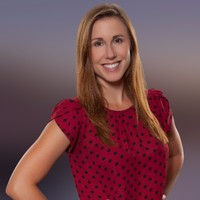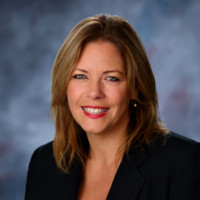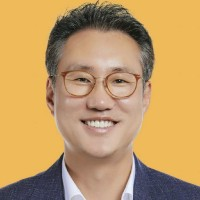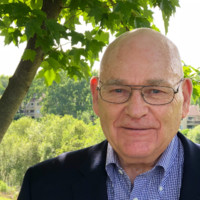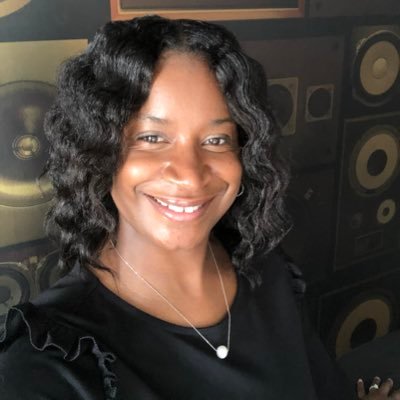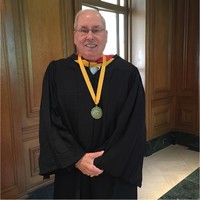About Dr. Michael Amendola

Dr. Michael Amendola is a vascular surgeon, professor, mentor, and thought leader in surgical innovation. He currently serves as Chief of Vascular Surgery at the Central Virginia VA Healthcare System and Professor of Surgery at the Virginia Commonwealth University (VCU) School of Medicine.
Raised in Richmond, Virginia, Dr. Amendola’s path to medicine was shaped by persistence and curiosity. After completing undergraduate and graduate degrees in chemistry, he earned his medical degree from VCU, followed by a five-year general surgery residency and a two-year vascular surgery fellowship.
His work spans clinical care, education, research, and innovation, with a focus on artificial intelligence in healthcare, 3D printing for surgical applications, and improving patient communication. He has contributed to national innovation efforts, including the VA’s 3D printing fellowship, and has published in both scholarly and professional forums.
A committed mentor, Dr. Amendola supports learners at every stage—from high school students to medical residents. He values team-based, purpose-driven practice and leads with a philosophy rooted in passion, presence, and compassion. Outside the OR, he enjoys podcasting about new technologies, walking, and playing bass guitar.
His guiding principle in medicine:
“If you wouldn’t want to do this at 3 AM, you shouldn’t be doing it at all.”
Blue Ocean: Could you tell us a bit about your background and journey into medicine?
Dr. Michael: I was born and raised in Richmond, Virginia, and went through public school here—elementary, middle, and high school. I attended a public university and earned both my undergraduate and graduate degrees in chemistry. Initially, I didn’t get into medical school and had to apply three times. During that time, I completed my master’s degree and worked in rational drug design at Merck & Co. in New Jersey. After that, I returned to Richmond to work in a genetics lab for a year before finally being accepted to medical school at Virginia Commonwealth University (VCU, formerly Medical College of Virginia). I completed medical school, general surgery training (five years), and vascular surgery training (two years), all at VCU.
I come from a family of strong women—my mother and grandmother played a huge role in inspiring me. On my dad’s side, I’m half Italian, and my grandfather was a contractor, which helped fuel my interest in surgery since working with my hands was a natural fit.
I worked in private practice for two years before returning to Richmond in 2011. I now serve as Professor of Surgery at VCU School of Medicine and Chief of Vascular Surgery at the Central Virginia VA Healthcare System. I oversee three surgeons, two nurse practitioners, residents, medical students, and rotating students.
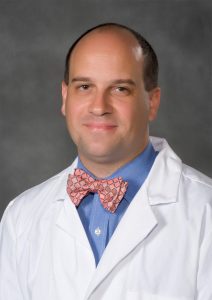
Blue Ocean: What’s one lesson in life that changed your perspective?
Dr. Michael: Failure is the greatest crucible for success. It took me three tries to get into medical school. That experience has made me appreciate the position I’ve attained. It also made me more approachable, as I understand struggle. The key, though, is mentorship during failure. While neither of my parents is a physician, they supported me through that time. They reminded me that sometimes you have to take a step back to move two steps forward. Interestingly, I didn’t even think I’d be a surgeon when I started medical school. I thought I’d go into pediatrics, but after one rotation, I realized it wasn’t for me. So, keeping your eyes open and staying true to yourself is essential.
Blue Ocean: Can you tell us about your expertise as a vascular surgeon and the types of cases where your knowledge is most applicable?
Dr. Michael: Vascular surgery today is increasingly focused on endovascular or minimally invasive procedures. This shift has allowed us to treat patients more safely. The devices and technologies are improving rapidly, but we must apply them appropriately.
At our division, we emphasize balancing endovascular and open surgery approaches. I’ve been practicing vascular surgery for 16 years. I trained under a senior partner with over 30 years of experience. My newer partners are highly skilled in both open and endovascular techniques.
We’re also seeing more complex patients due to advances in cardiac care—people live longer and present with vascular issues that previously would have gone untreated. Our job is often to manage symptoms and improve quality of life. We can rarely “cure” in vascular surgery; instead, we aim to stabilize conditions and extend functional life.

Blue Ocean: How do you think people can recognize their true calling and what qualities set successful medical professionals apart?
Dr. Michael: A major issue in medicine is burnout or moral injury, often because people enter the field without fully understanding what it entails. Many follow the traditional educational path without stopping to ask if this is what they really want. As a mentor, I encourage students and residents to reflect on their goals. It’s okay to pivot. I’ve seen students leave medicine for entirely different careers, and supporting those decisions is part of being a good mentor.
Some fields, like orthopedics, attract a consistent 20% of med students from start to finish. Vascular surgery, on the other hand, is notable for converting many physicians from other specialties—it’s even the top surgical choice among female medical students. The key is honest engagement: present the field clearly and help individuals assess if it aligns with their life goals. Mentors play a big role in this process and should also help mentees pivot when needed.
Success in medicine requires passion, self-awareness, and adaptability. I tell medical students: “If you wouldn’t want to do this at 3 AM, then you shouldn’t be doing it at all.” It’s always inspiring when someone says, “You helped me find my path,” whether that’s in vascular surgery or another care-related field.
Blue Ocean: What you do is a very complex job. Do you find explaining it to others difficult? How do you explain complex scientific concepts to non-experts?
Dr. Michael: The first step is understanding who you’re talking to. We’ve published on healthcare literacy in the vascular population. One of my partners recently published an article on using AI to develop better patient communication materials.
You start by identifying the problem—what is the pathology—and then walk them through the solutions: “Here’s what we can do to fix it. After we fix it, here’s what else needs to happen.” But you also need to step back and consider the patient’s full medical context—heart disease, blood pressure, diabetes, etc.
Vascular surgery itself is relatively simple in principle: get blood from point A to point B. I often tell patients, “I’m the plumber of your body.” I deal with your neck, chest, belly, legs, and arms. I avoid technical jargon—patients don’t need the brand or size of the balloon. They just need to understand that we’re using a balloon to push disease against the vessel wall. Simple concepts stick. I also tell patients, “You’ll have more questions—write them down and we’ll talk again.” It often takes multiple conversations to fully explain the procedure. If we’re dealing with a complication, that’s when we need to communicate more. I always tell my team: increase communication during problems.
Patients also experience disease in a lived, emotional way. We must meet them where they are—intellectually, emotionally, and even spiritually. There’s literature, like Kubler-Ross, on stages of disease and grief—anger, bargaining, and denial. Understanding those dynamics, especially with the family members involved, is crucial. Families bring their own emotional context to the hospital, too. You must balance it all with empathy and clarity.
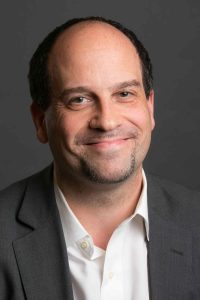
Blue Ocean: How do you maintain open communication within your surgical team and hospital?
Dr. Michael: I promote a flat environment—anyone can share concerns or insights, regardless of their role. Even custodial staff may notice patient issues we might miss, so I encourage listening to every team member. Particularly with AI and data evolving, it’s crucial not to narrow our perspective. Basic observations—such as noticing whether a patient is eating—can reveal a lot about their health. Always keep an open mind and stay attentive to all input for patient safety and success.
Blue Ocean: Could you share a few thoughts on the importance of reputation? What does it mean to you?
Dr. Michael: Reputation and personal brand are important. One part is formal, such as board certifications, degrees, and continuing medical education. But the other part is visibility within your field and hospital. The key is presence. You don’t need to be in the hospital every day, but being available when someone needs you—like picking up the phone—goes a long way. It supports patient care and shows reliability to your colleagues. Presence is crucial for a good reputation, both online and offline.
Blue Ocean: How do you balance your professional and personal life, especially in a demanding field like surgery?
Dr. Michael: Surgery is indeed demanding, but it’s more balanced now than when I was training. Back then, only about 10–15% of residents were female. Today, the majority of our medical students and residents are women, and this reflects broader changes in medicine.
I continue to live in Richmond, largely to support my elderly parents and be close to my nephew, who is pursuing a career as an airline pilot. Work-life balance for me is about mutual support—balancing my clinical responsibilities while also helping my colleagues when they need flexibility. Group practice helps make that possible. The growing complexity of medicine requires us to be mindful of workforce burnout and mental health. We need to create systems that support each other’s needs to ensure sustainability in the profession.
Blue Ocean: How do you approach mentoring or guiding those who look up to you?
Dr. Michael: Mentoring occurs at various levels. I have formal mentoring relationships with my residents, medical students, and people who rotate with us. I also do a fair amount of remote mentoring for students across the U.S. who are interested in vascular surgery and even students who aren’t in medicine yet but are considering it. During the pandemic, I mentored a high school student remotely. We brought her virtually into our division so she could see what we do as surgeons. So mentoring can be both formal and informal.
There’s good literature on mentorship in medicine. A set of papers from Penn talks about mentoring malpractice—how even a mentor can cause problems. Generally, I keep things open-ended. Residents and students can approach me with ideas for projects. I often write papers with them, even outside my core field, to help them gain experience and improve their CVs.
I believe mentorship, once established, is lifelong. I still talk to my general surgery program director almost daily. Those relationships evolve into friendships. I also keep the door open for mentees who may return years later with questions about jobs, contracts, or legal issues.
When they’re going through hard times—thinking of switching careers or struggling with a program—I increase the frequency of communication. It’s about adjusting based on need and being present at the right time.
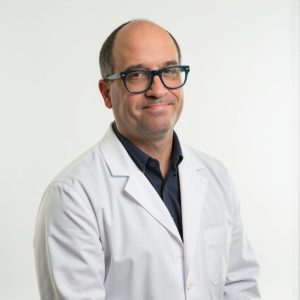
Blue Ocean: Do you have any hobbies or interests that help you maintain a balanced lifestyle outside of work?
Dr. Michael: I walk a lot. I used to run, but my knees don’t allow that anymore. When I walk, I listen to a lot of content, especially about AI, since we’re shifting our approach to it now. I spend time with my elderly parents and help care for them. I love my house and my deck. I also play bass guitar. I’m still learning, but it’s great being a novice at something again. It keeps me grounded and gives me joy. Maybe one day I’ll even join a band!
Blue Ocean: Is there a particular quote or advice that has guided you through your career?
Dr. Michael: Just do it. Don’t get stuck in potential or theoretical thinking—take action. I learned this during my innovation fellowship with the VA. I was part of the VA’s 3D printing efforts. Our mantra was “fail fast”—meaning pick a direction, start moving, and you’ll quickly find out if it’s right or wrong.
My father always told me the same: “Pick a direction and move in it.” Especially for younger generations who get caught in “what ifs,” it’s important to act. That’s what I tell my 20-year-old nephew, too. Push the fear aside and just move forward.
Conclusion
Dr. Michael Amendola’s story is a testament to resilience, purpose, and the power of mentorship. From overcoming early setbacks to leading innovations in vascular surgery and patient care, his journey reflects a deep commitment to both excellence and empathy. Whether he’s mentoring the next generation of surgeons, innovating with cutting-edge technologies, or simply walking to the rhythm of a podcast, Dr. Amendola embodies lifelong learning. His passion-driven philosophy and grounded presence continue to leave a lasting impact on the medical industry and the lives he touches.
Do you have a personal or professional story that can inspire other people into becoming the best version of themselves?
You are welcome to share your journey with our audience.



